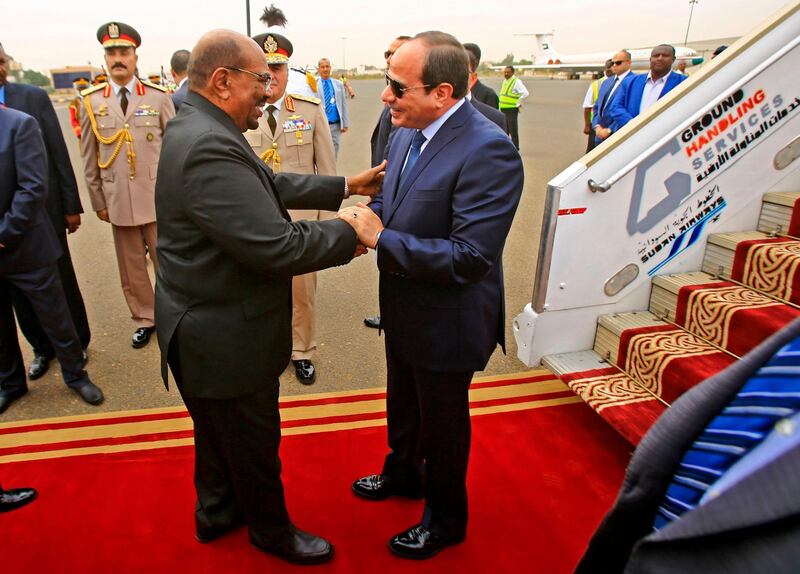Driven by security and water concerns, Egypt has been actively wooing Sudan in a bid to draw its southern neighbour away from regional rivals Turkey and Qatar and enlist its support in a dispute with Ethiopia over Cairo's vital share of Nile waters.
Until 1956, Sudan was a condominium territory over which Egypt and the United Kingdom exercised joint sovereignty, meaning Egyptian influence once stretched from the shores of the Mediterranean deep into sub-Saharan Africa. Relations between the two Nile-basin, Afro-Arab nations have been fraught as a result of this colonial legacy, with tension often focusing on a dispute over a border strip controlled by Egypt and claimed by Sudan.
Ambitious attempts over the years to build a solid economic and political partnership have failed or made little progress and the rise to power in 1989 of an Islamist-leaning government led by Sudanese President Omar Al Bashir cast a dark shadow on relations.
More recently, Egypt was seriously alarmed by some of Sudan’s foreign policy choices, including Khartoum’s one-time flirtation with non-Arab and mostly Shiite Iran and later its friendly relations with Qatar and Turkey, two of Cairo’s chief regional rivals.
Equally alarming to Egypt has been Sudan’s perceived decision to side with Ethiopia in the latter’s dispute with Egypt over the construction of a major dam on the Blue Nile, which Egypt fears could significantly reduce its share of a river upon which it relies for 90 per cent of its fresh water needs. In siding with Addis Ababa, Khartoum hoped to secure a share of the the electricity to be generated from the Grand Ethiopian Renaissance Dam and also to pressure Cairo into a compromise on the border dispute.
Over the past two years, Sudan has accused Cairo of meddling in its internal affairs and of siding with rivals in South Sudan and Uganda. At the height of tensions earlier this year, Khartoum recalled its ambassador to Cairo and sanctioned media campaigns calling on the Sudanese to boycott Egyptian products and travel.
“Egypt’s relations with Sudan have always been through ups and downs,” said Hany Raslan, a Sudan expert with Cairo’s Al Ahram Centre for Political and Strategic Studies. “What the two countries are doing now is building genuine bilateral interests that could serve as a safety valve against future tensions.”
Egypt views Sudan as its strategic backyard, where it closely monitors potential threats to its national security.
It has, for example, bristled over Sudan’s offer of asylum to senior members of the Muslim Brotherhood, an outlawed Islamist group whose stalwart Mohamed Morsi was president for a year before the military, then led by current President Abdel Fattah El Sisi, removed him amid mass protests in 2013.
Egypt has also accused Sudan of allowing human trafficking and the smuggling of weapons across their porous desert border to ISIS militants fighting security forces in the Sinai Peninsula. Egypt has also complained that Sudan has been aiding extremist Islamist groups opposed to Libya’s Gen Khalifa Haftar, the Cairo- and UAE-backed commander of the self-styled Libyan National Army.
It is against this backdrop that Egypt under President El Sisi has been reaching out to Sudan in a way not seen in decades, perhaps with the knowledge that the battered economy of its southern neighbour following the secession of South Sudan in 2011 makes it more open to offers of economic cooperation and technical aid.
Making his sixth visit to Sudan since taking office in 2014, President El Sisi’s gushing remarks last week underlined just how much Cairo needs Khartoum on its side.
“No one, no matter how hard he tries, can count all that binds of our two nations,” he said .
“What binds us ... is rarely found between two nations anywhere in the world,” he added after some half-dozen bilateral co-operation agreements were signed, including a deal to export surplus electricity to Sudan and the establishment of a cross-border rail link.
President Al Bashir reciprocated with some upbeat rhetoric of his own along with a decision to lift a ban on imports of Egyptian agricultural produce that his government imposed last year when relations were at their lowest ebb in years. "We have agreed to turn this relationship into a strategic one in every field," he said.
__________
Read more:
Sudan protests over Egyptian TV serial about terrorists
Sudan reshuffle brings in new oil and foreign ministers
South Sudanese Christians seek refuge with an unlikely neighbour
__________
Significantly, neither leader mentioned the border dispute, a sign that they may have decided to move forward without having to resolve that conflict for the moment.
Michael W Hanna of the New York-based Century Foundation believes the Egyptian-Sudanese rapprochement takes on added significance coming at a time when a reformist leader is at the helm in Ethiopia in the form of Prime Minister Abiy Ahmed. His stunning reconciliation with sworn enemy Eritrea has changed the region’s political landscape.
“In that climate of uncertainty, and despite pre-existing tensions over border issues and political dissidents, it is perhaps unsurprising that Egypt and Sudan have sought to mend fences and avert diplomatic deterioration,” said Mr Hanna.





